An Analysis of Leadership, Management, and Operations at Tesco
VerifiedAdded on 2020/11/23
|13
|3992
|208
Report
AI Summary
This report examines the leadership and management practices within Tesco, a multinational retailer. It begins by defining leadership and management, highlighting their crucial roles in achieving organizational goals. The report then delves into the roles and characteristics of leaders and managers, differentiating their approaches and responsibilities in various situations, such as labor turnover, task completion, and interpersonal conflicts. It explores relevant theories and models, including situational, contingency, and system leadership. Furthermore, the report analyzes different approaches to operations management, such as Total Quality Management (TQM), Just-in-Time (JIT) inventory, and the Six Sigma approach, detailing their principles, applications, and the roles of leaders and managers in implementing them. The analysis provides insights into how Tesco can enhance its operational efficiency and achieve its strategic objectives.
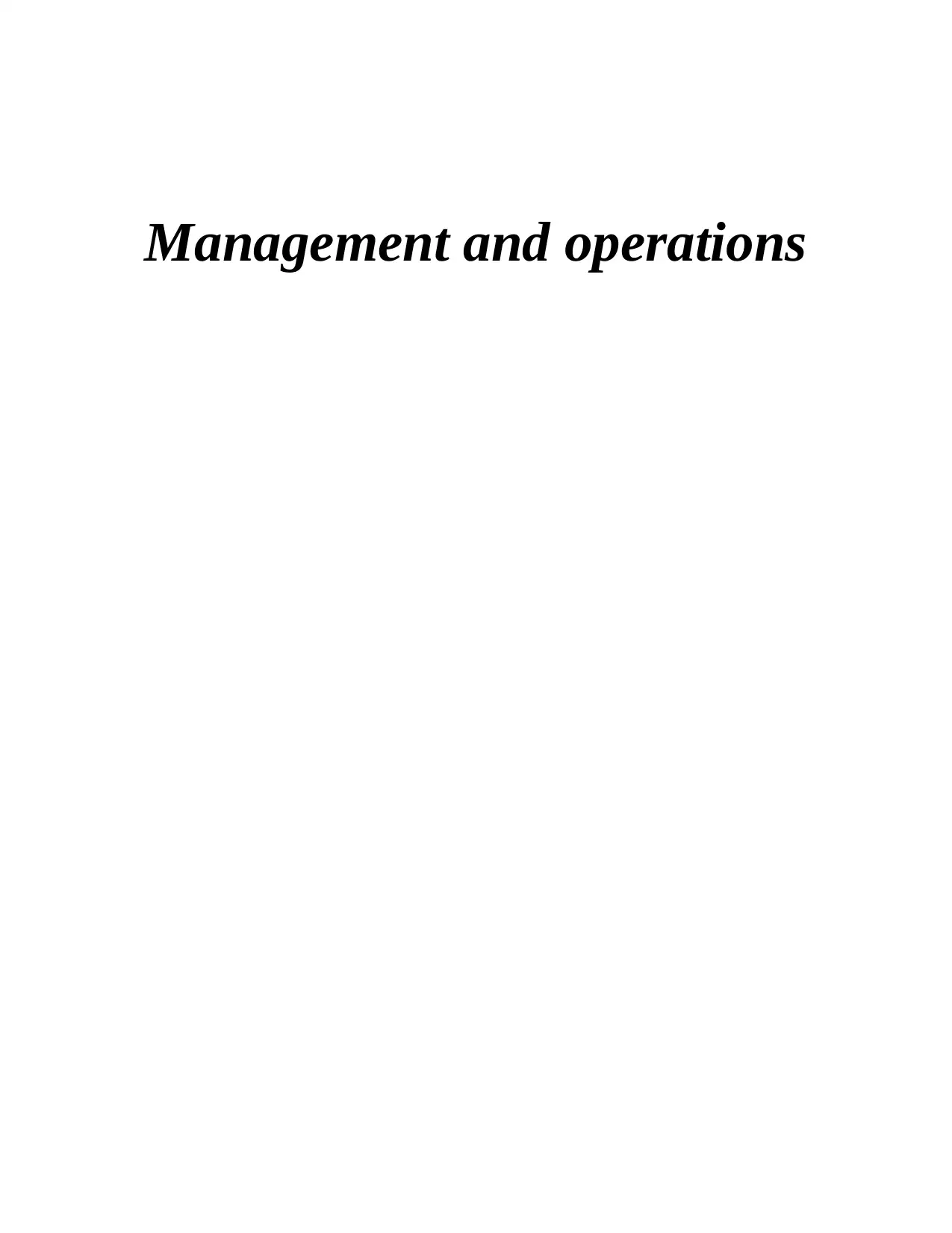
Management and operations
Paraphrase This Document
Need a fresh take? Get an instant paraphrase of this document with our AI Paraphraser
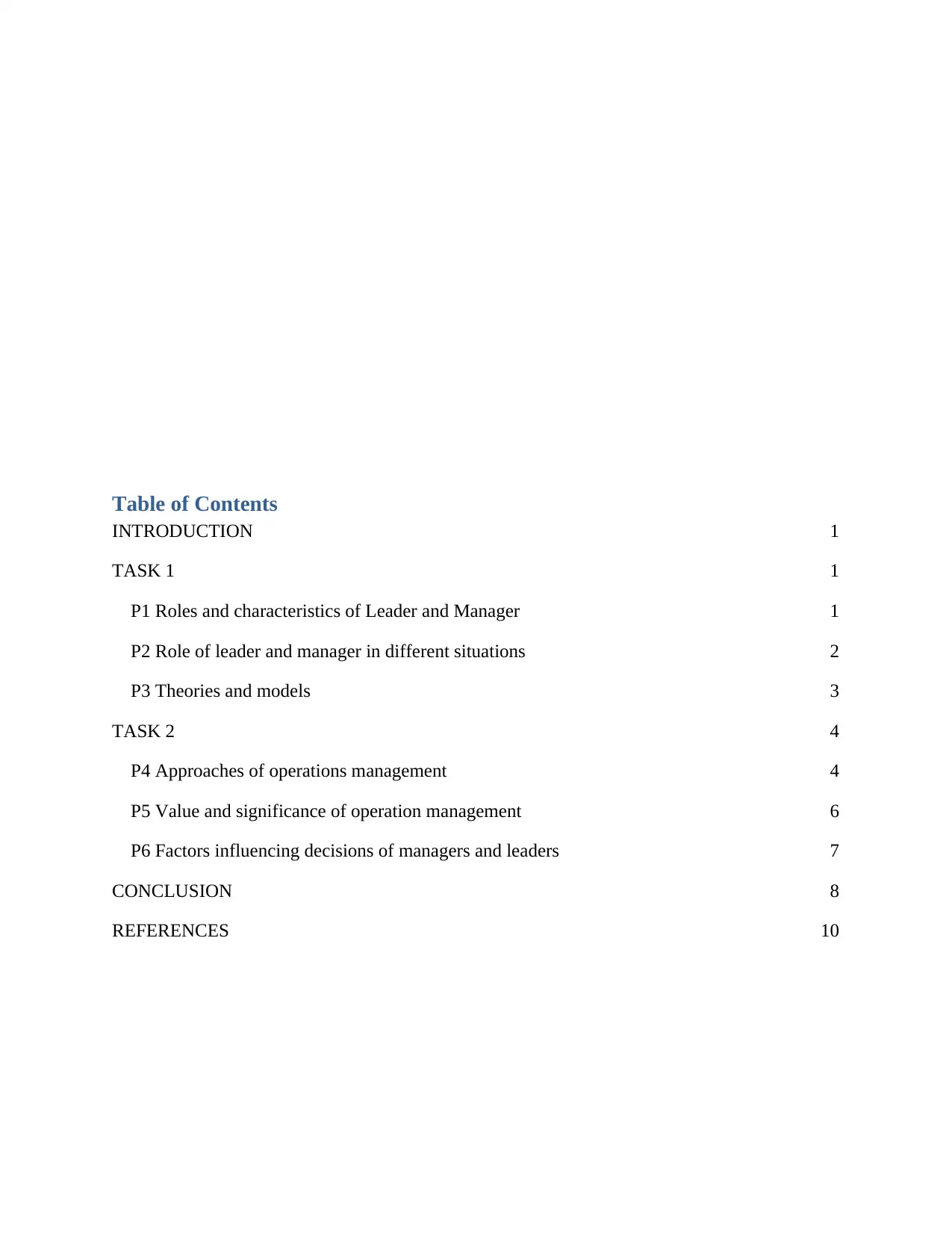
Table of Contents
INTRODUCTION 1
TASK 1 1
P1 Roles and characteristics of Leader and Manager 1
P2 Role of leader and manager in different situations 2
P3 Theories and models 3
TASK 2 4
P4 Approaches of operations management 4
P5 Value and significance of operation management 6
P6 Factors influencing decisions of managers and leaders 7
CONCLUSION 8
REFERENCES 10
INTRODUCTION 1
TASK 1 1
P1 Roles and characteristics of Leader and Manager 1
P2 Role of leader and manager in different situations 2
P3 Theories and models 3
TASK 2 4
P4 Approaches of operations management 4
P5 Value and significance of operation management 6
P6 Factors influencing decisions of managers and leaders 7
CONCLUSION 8
REFERENCES 10
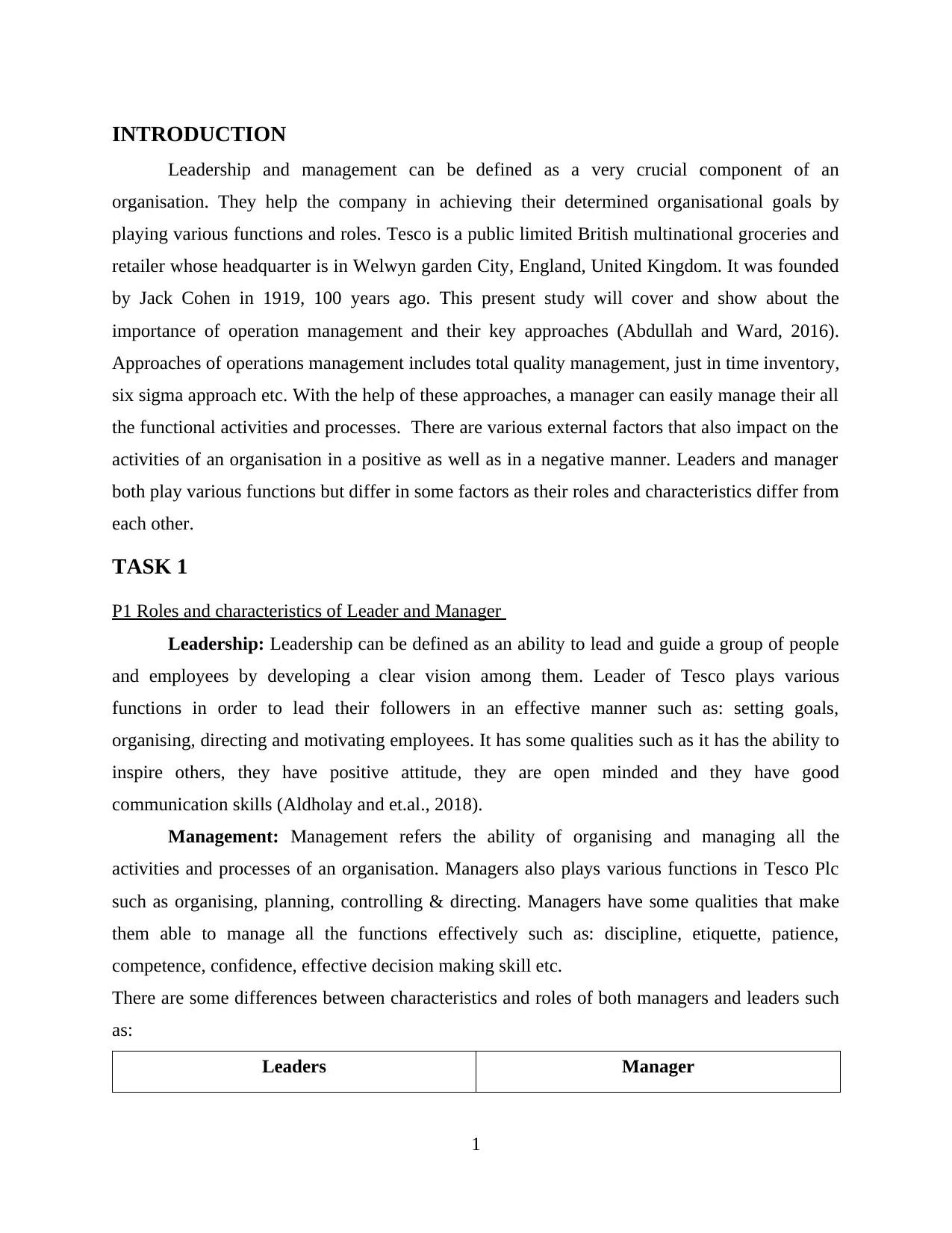
INTRODUCTION
Leadership and management can be defined as a very crucial component of an
organisation. They help the company in achieving their determined organisational goals by
playing various functions and roles. Tesco is a public limited British multinational groceries and
retailer whose headquarter is in Welwyn garden City, England, United Kingdom. It was founded
by Jack Cohen in 1919, 100 years ago. This present study will cover and show about the
importance of operation management and their key approaches (Abdullah and Ward, 2016).
Approaches of operations management includes total quality management, just in time inventory,
six sigma approach etc. With the help of these approaches, a manager can easily manage their all
the functional activities and processes. There are various external factors that also impact on the
activities of an organisation in a positive as well as in a negative manner. Leaders and manager
both play various functions but differ in some factors as their roles and characteristics differ from
each other.
TASK 1
P1 Roles and characteristics of Leader and Manager
Leadership: Leadership can be defined as an ability to lead and guide a group of people
and employees by developing a clear vision among them. Leader of Tesco plays various
functions in order to lead their followers in an effective manner such as: setting goals,
organising, directing and motivating employees. It has some qualities such as it has the ability to
inspire others, they have positive attitude, they are open minded and they have good
communication skills (Aldholay and et.al., 2018).
Management: Management refers the ability of organising and managing all the
activities and processes of an organisation. Managers also plays various functions in Tesco Plc
such as organising, planning, controlling & directing. Managers have some qualities that make
them able to manage all the functions effectively such as: discipline, etiquette, patience,
competence, confidence, effective decision making skill etc.
There are some differences between characteristics and roles of both managers and leaders such
as:
Leaders Manager
1
Leadership and management can be defined as a very crucial component of an
organisation. They help the company in achieving their determined organisational goals by
playing various functions and roles. Tesco is a public limited British multinational groceries and
retailer whose headquarter is in Welwyn garden City, England, United Kingdom. It was founded
by Jack Cohen in 1919, 100 years ago. This present study will cover and show about the
importance of operation management and their key approaches (Abdullah and Ward, 2016).
Approaches of operations management includes total quality management, just in time inventory,
six sigma approach etc. With the help of these approaches, a manager can easily manage their all
the functional activities and processes. There are various external factors that also impact on the
activities of an organisation in a positive as well as in a negative manner. Leaders and manager
both play various functions but differ in some factors as their roles and characteristics differ from
each other.
TASK 1
P1 Roles and characteristics of Leader and Manager
Leadership: Leadership can be defined as an ability to lead and guide a group of people
and employees by developing a clear vision among them. Leader of Tesco plays various
functions in order to lead their followers in an effective manner such as: setting goals,
organising, directing and motivating employees. It has some qualities such as it has the ability to
inspire others, they have positive attitude, they are open minded and they have good
communication skills (Aldholay and et.al., 2018).
Management: Management refers the ability of organising and managing all the
activities and processes of an organisation. Managers also plays various functions in Tesco Plc
such as organising, planning, controlling & directing. Managers have some qualities that make
them able to manage all the functions effectively such as: discipline, etiquette, patience,
competence, confidence, effective decision making skill etc.
There are some differences between characteristics and roles of both managers and leaders such
as:
Leaders Manager
1
⊘ This is a preview!⊘
Do you want full access?
Subscribe today to unlock all pages.

Trusted by 1+ million students worldwide
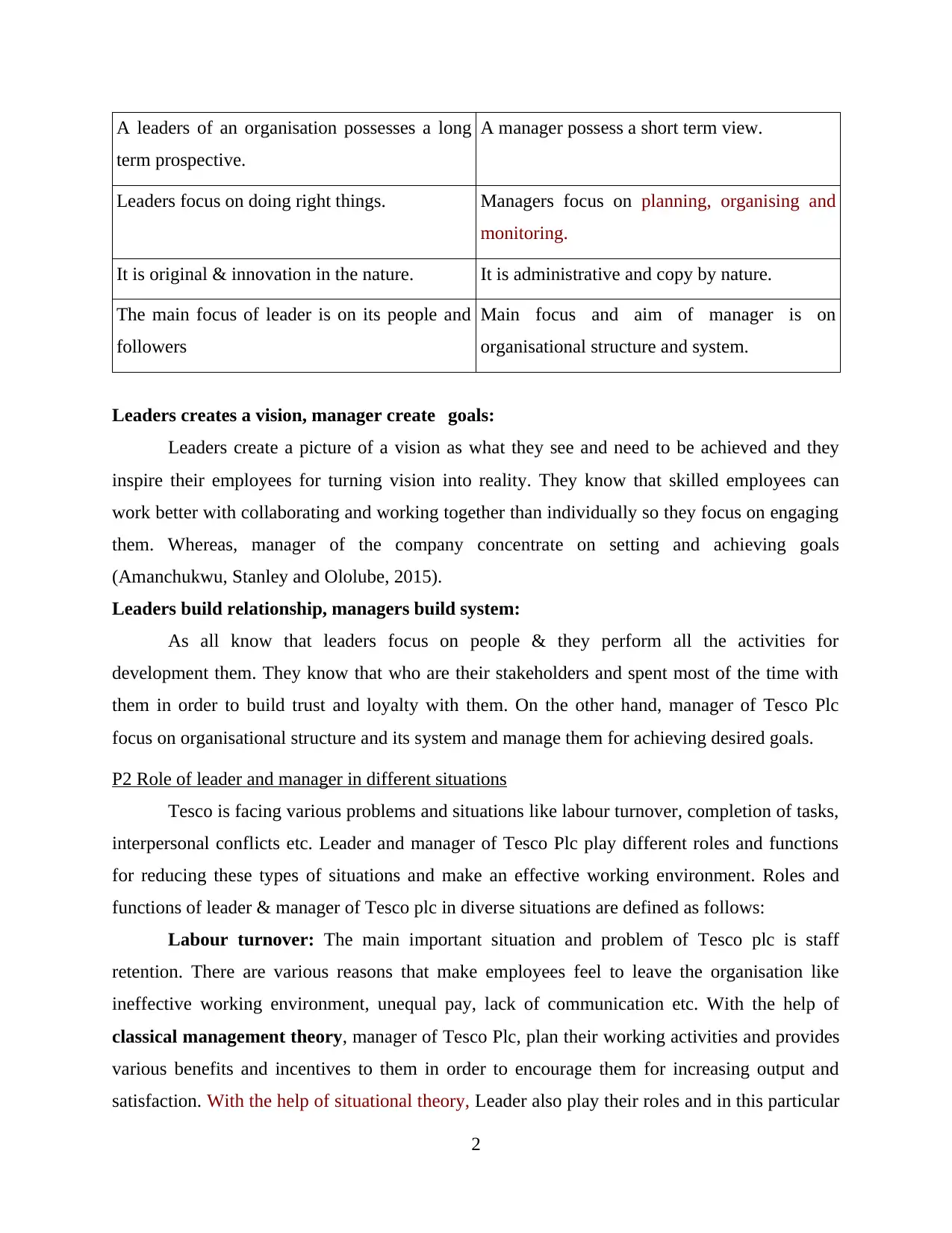
A leaders of an organisation possesses a long
term prospective.
A manager possess a short term view.
Leaders focus on doing right things. Managers focus on planning, organising and
monitoring.
It is original & innovation in the nature. It is administrative and copy by nature.
The main focus of leader is on its people and
followers
Main focus and aim of manager is on
organisational structure and system.
Leaders creates a vision, manager create goals:
Leaders create a picture of a vision as what they see and need to be achieved and they
inspire their employees for turning vision into reality. They know that skilled employees can
work better with collaborating and working together than individually so they focus on engaging
them. Whereas, manager of the company concentrate on setting and achieving goals
(Amanchukwu, Stanley and Ololube, 2015).
Leaders build relationship, managers build system:
As all know that leaders focus on people & they perform all the activities for
development them. They know that who are their stakeholders and spent most of the time with
them in order to build trust and loyalty with them. On the other hand, manager of Tesco Plc
focus on organisational structure and its system and manage them for achieving desired goals.
P2 Role of leader and manager in different situations
Tesco is facing various problems and situations like labour turnover, completion of tasks,
interpersonal conflicts etc. Leader and manager of Tesco Plc play different roles and functions
for reducing these types of situations and make an effective working environment. Roles and
functions of leader & manager of Tesco plc in diverse situations are defined as follows:
Labour turnover: The main important situation and problem of Tesco plc is staff
retention. There are various reasons that make employees feel to leave the organisation like
ineffective working environment, unequal pay, lack of communication etc. With the help of
classical management theory, manager of Tesco Plc, plan their working activities and provides
various benefits and incentives to them in order to encourage them for increasing output and
satisfaction. With the help of situational theory, Leader also play their roles and in this particular
2
term prospective.
A manager possess a short term view.
Leaders focus on doing right things. Managers focus on planning, organising and
monitoring.
It is original & innovation in the nature. It is administrative and copy by nature.
The main focus of leader is on its people and
followers
Main focus and aim of manager is on
organisational structure and system.
Leaders creates a vision, manager create goals:
Leaders create a picture of a vision as what they see and need to be achieved and they
inspire their employees for turning vision into reality. They know that skilled employees can
work better with collaborating and working together than individually so they focus on engaging
them. Whereas, manager of the company concentrate on setting and achieving goals
(Amanchukwu, Stanley and Ololube, 2015).
Leaders build relationship, managers build system:
As all know that leaders focus on people & they perform all the activities for
development them. They know that who are their stakeholders and spent most of the time with
them in order to build trust and loyalty with them. On the other hand, manager of Tesco Plc
focus on organisational structure and its system and manage them for achieving desired goals.
P2 Role of leader and manager in different situations
Tesco is facing various problems and situations like labour turnover, completion of tasks,
interpersonal conflicts etc. Leader and manager of Tesco Plc play different roles and functions
for reducing these types of situations and make an effective working environment. Roles and
functions of leader & manager of Tesco plc in diverse situations are defined as follows:
Labour turnover: The main important situation and problem of Tesco plc is staff
retention. There are various reasons that make employees feel to leave the organisation like
ineffective working environment, unequal pay, lack of communication etc. With the help of
classical management theory, manager of Tesco Plc, plan their working activities and provides
various benefits and incentives to them in order to encourage them for increasing output and
satisfaction. With the help of situational theory, Leader also play their roles and in this particular
2
Paraphrase This Document
Need a fresh take? Get an instant paraphrase of this document with our AI Paraphraser
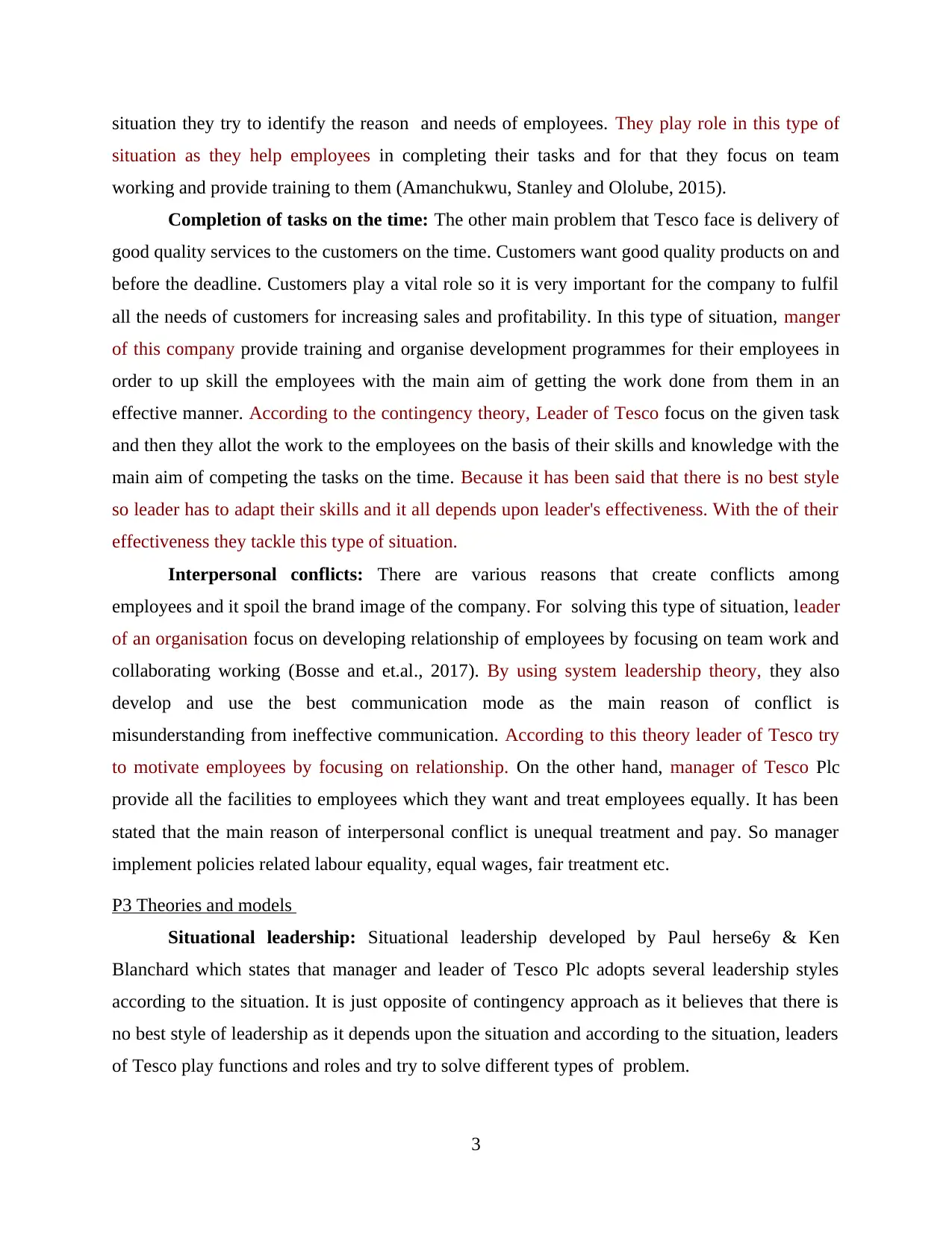
situation they try to identify the reason and needs of employees. They play role in this type of
situation as they help employees in completing their tasks and for that they focus on team
working and provide training to them (Amanchukwu, Stanley and Ololube, 2015).
Completion of tasks on the time: The other main problem that Tesco face is delivery of
good quality services to the customers on the time. Customers want good quality products on and
before the deadline. Customers play a vital role so it is very important for the company to fulfil
all the needs of customers for increasing sales and profitability. In this type of situation, manger
of this company provide training and organise development programmes for their employees in
order to up skill the employees with the main aim of getting the work done from them in an
effective manner. According to the contingency theory, Leader of Tesco focus on the given task
and then they allot the work to the employees on the basis of their skills and knowledge with the
main aim of competing the tasks on the time. Because it has been said that there is no best style
so leader has to adapt their skills and it all depends upon leader's effectiveness. With the of their
effectiveness they tackle this type of situation.
Interpersonal conflicts: There are various reasons that create conflicts among
employees and it spoil the brand image of the company. For solving this type of situation, leader
of an organisation focus on developing relationship of employees by focusing on team work and
collaborating working (Bosse and et.al., 2017). By using system leadership theory, they also
develop and use the best communication mode as the main reason of conflict is
misunderstanding from ineffective communication. According to this theory leader of Tesco try
to motivate employees by focusing on relationship. On the other hand, manager of Tesco Plc
provide all the facilities to employees which they want and treat employees equally. It has been
stated that the main reason of interpersonal conflict is unequal treatment and pay. So manager
implement policies related labour equality, equal wages, fair treatment etc.
P3 Theories and models
Situational leadership: Situational leadership developed by Paul herse6y & Ken
Blanchard which states that manager and leader of Tesco Plc adopts several leadership styles
according to the situation. It is just opposite of contingency approach as it believes that there is
no best style of leadership as it depends upon the situation and according to the situation, leaders
of Tesco play functions and roles and try to solve different types of problem.
3
situation as they help employees in completing their tasks and for that they focus on team
working and provide training to them (Amanchukwu, Stanley and Ololube, 2015).
Completion of tasks on the time: The other main problem that Tesco face is delivery of
good quality services to the customers on the time. Customers want good quality products on and
before the deadline. Customers play a vital role so it is very important for the company to fulfil
all the needs of customers for increasing sales and profitability. In this type of situation, manger
of this company provide training and organise development programmes for their employees in
order to up skill the employees with the main aim of getting the work done from them in an
effective manner. According to the contingency theory, Leader of Tesco focus on the given task
and then they allot the work to the employees on the basis of their skills and knowledge with the
main aim of competing the tasks on the time. Because it has been said that there is no best style
so leader has to adapt their skills and it all depends upon leader's effectiveness. With the of their
effectiveness they tackle this type of situation.
Interpersonal conflicts: There are various reasons that create conflicts among
employees and it spoil the brand image of the company. For solving this type of situation, leader
of an organisation focus on developing relationship of employees by focusing on team work and
collaborating working (Bosse and et.al., 2017). By using system leadership theory, they also
develop and use the best communication mode as the main reason of conflict is
misunderstanding from ineffective communication. According to this theory leader of Tesco try
to motivate employees by focusing on relationship. On the other hand, manager of Tesco Plc
provide all the facilities to employees which they want and treat employees equally. It has been
stated that the main reason of interpersonal conflict is unequal treatment and pay. So manager
implement policies related labour equality, equal wages, fair treatment etc.
P3 Theories and models
Situational leadership: Situational leadership developed by Paul herse6y & Ken
Blanchard which states that manager and leader of Tesco Plc adopts several leadership styles
according to the situation. It is just opposite of contingency approach as it believes that there is
no best style of leadership as it depends upon the situation and according to the situation, leaders
of Tesco play functions and roles and try to solve different types of problem.
3
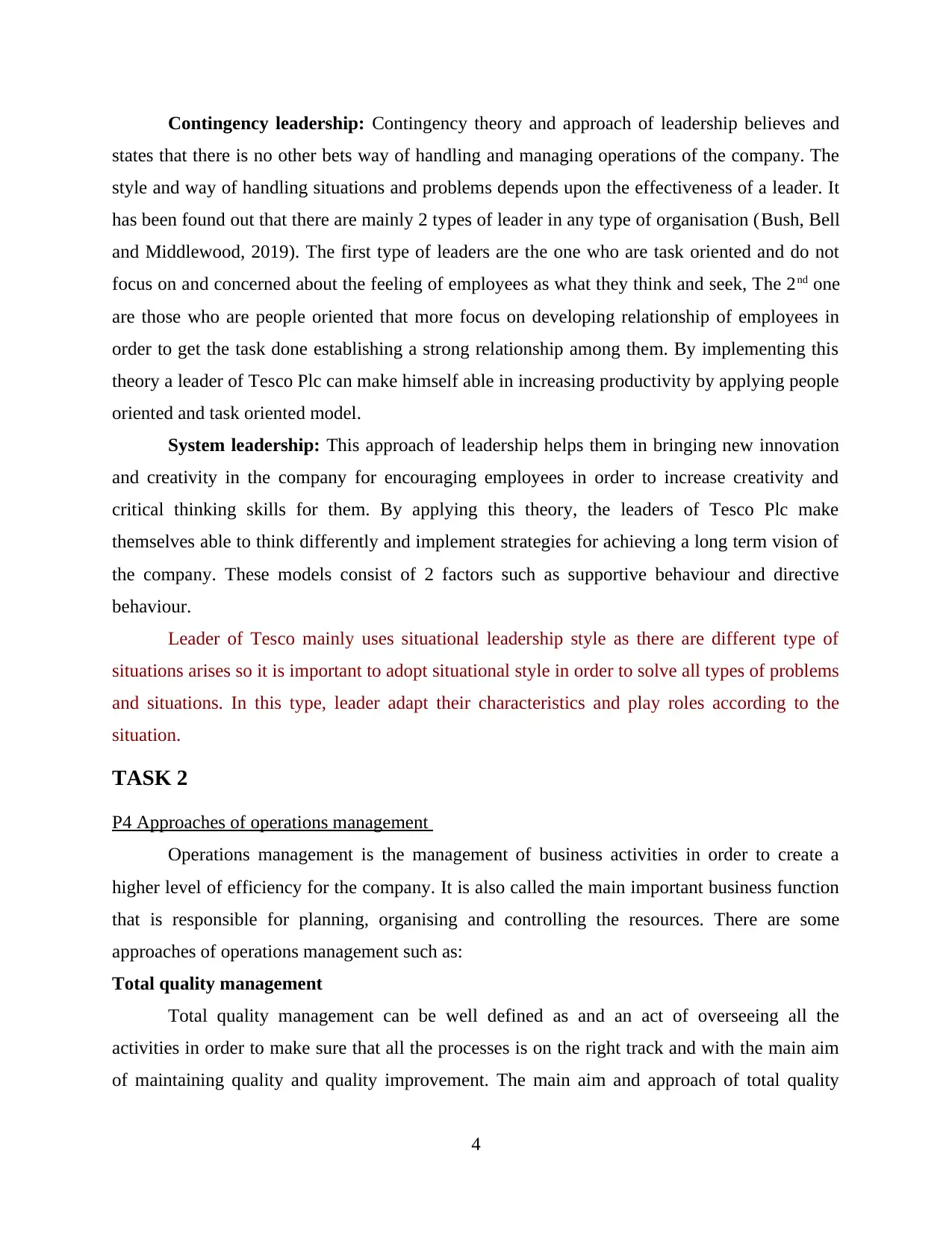
Contingency leadership: Contingency theory and approach of leadership believes and
states that there is no other bets way of handling and managing operations of the company. The
style and way of handling situations and problems depends upon the effectiveness of a leader. It
has been found out that there are mainly 2 types of leader in any type of organisation (Bush, Bell
and Middlewood, 2019). The first type of leaders are the one who are task oriented and do not
focus on and concerned about the feeling of employees as what they think and seek, The 2nd one
are those who are people oriented that more focus on developing relationship of employees in
order to get the task done establishing a strong relationship among them. By implementing this
theory a leader of Tesco Plc can make himself able in increasing productivity by applying people
oriented and task oriented model.
System leadership: This approach of leadership helps them in bringing new innovation
and creativity in the company for encouraging employees in order to increase creativity and
critical thinking skills for them. By applying this theory, the leaders of Tesco Plc make
themselves able to think differently and implement strategies for achieving a long term vision of
the company. These models consist of 2 factors such as supportive behaviour and directive
behaviour.
Leader of Tesco mainly uses situational leadership style as there are different type of
situations arises so it is important to adopt situational style in order to solve all types of problems
and situations. In this type, leader adapt their characteristics and play roles according to the
situation.
TASK 2
P4 Approaches of operations management
Operations management is the management of business activities in order to create a
higher level of efficiency for the company. It is also called the main important business function
that is responsible for planning, organising and controlling the resources. There are some
approaches of operations management such as:
Total quality management
Total quality management can be well defined as and an act of overseeing all the
activities in order to make sure that all the processes is on the right track and with the main aim
of maintaining quality and quality improvement. The main aim and approach of total quality
4
states that there is no other bets way of handling and managing operations of the company. The
style and way of handling situations and problems depends upon the effectiveness of a leader. It
has been found out that there are mainly 2 types of leader in any type of organisation (Bush, Bell
and Middlewood, 2019). The first type of leaders are the one who are task oriented and do not
focus on and concerned about the feeling of employees as what they think and seek, The 2nd one
are those who are people oriented that more focus on developing relationship of employees in
order to get the task done establishing a strong relationship among them. By implementing this
theory a leader of Tesco Plc can make himself able in increasing productivity by applying people
oriented and task oriented model.
System leadership: This approach of leadership helps them in bringing new innovation
and creativity in the company for encouraging employees in order to increase creativity and
critical thinking skills for them. By applying this theory, the leaders of Tesco Plc make
themselves able to think differently and implement strategies for achieving a long term vision of
the company. These models consist of 2 factors such as supportive behaviour and directive
behaviour.
Leader of Tesco mainly uses situational leadership style as there are different type of
situations arises so it is important to adopt situational style in order to solve all types of problems
and situations. In this type, leader adapt their characteristics and play roles according to the
situation.
TASK 2
P4 Approaches of operations management
Operations management is the management of business activities in order to create a
higher level of efficiency for the company. It is also called the main important business function
that is responsible for planning, organising and controlling the resources. There are some
approaches of operations management such as:
Total quality management
Total quality management can be well defined as and an act of overseeing all the
activities in order to make sure that all the processes is on the right track and with the main aim
of maintaining quality and quality improvement. The main aim and approach of total quality
4
⊘ This is a preview!⊘
Do you want full access?
Subscribe today to unlock all pages.

Trusted by 1+ million students worldwide
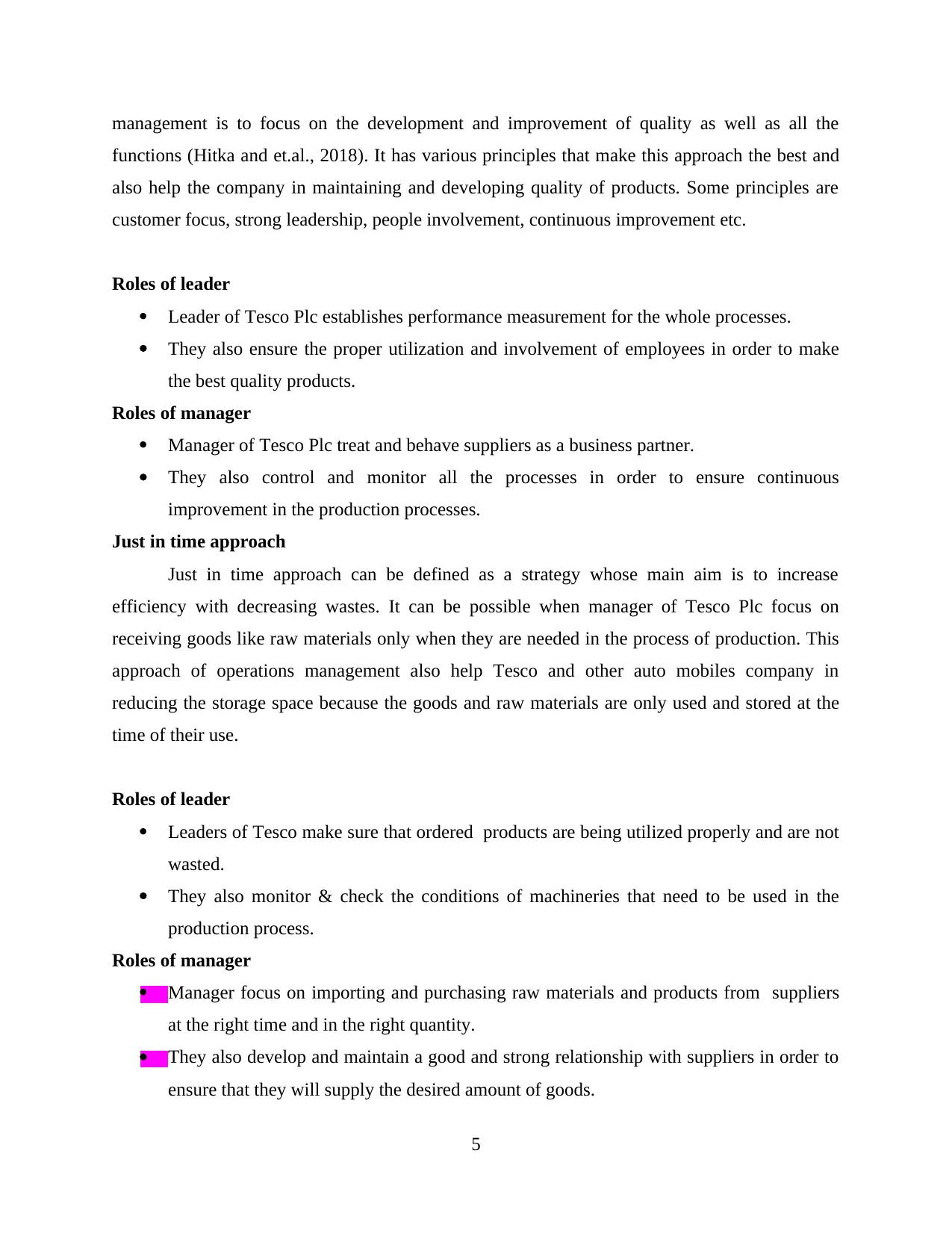
management is to focus on the development and improvement of quality as well as all the
functions (Hitka and et.al., 2018). It has various principles that make this approach the best and
also help the company in maintaining and developing quality of products. Some principles are
customer focus, strong leadership, people involvement, continuous improvement etc.
Roles of leader
Leader of Tesco Plc establishes performance measurement for the whole processes.
They also ensure the proper utilization and involvement of employees in order to make
the best quality products.
Roles of manager
Manager of Tesco Plc treat and behave suppliers as a business partner.
They also control and monitor all the processes in order to ensure continuous
improvement in the production processes.
Just in time approach
Just in time approach can be defined as a strategy whose main aim is to increase
efficiency with decreasing wastes. It can be possible when manager of Tesco Plc focus on
receiving goods like raw materials only when they are needed in the process of production. This
approach of operations management also help Tesco and other auto mobiles company in
reducing the storage space because the goods and raw materials are only used and stored at the
time of their use.
Roles of leader
Leaders of Tesco make sure that ordered products are being utilized properly and are not
wasted.
They also monitor & check the conditions of machineries that need to be used in the
production process.
Roles of manager
Manager focus on importing and purchasing raw materials and products from suppliers
at the right time and in the right quantity.
They also develop and maintain a good and strong relationship with suppliers in order to
ensure that they will supply the desired amount of goods.
5
functions (Hitka and et.al., 2018). It has various principles that make this approach the best and
also help the company in maintaining and developing quality of products. Some principles are
customer focus, strong leadership, people involvement, continuous improvement etc.
Roles of leader
Leader of Tesco Plc establishes performance measurement for the whole processes.
They also ensure the proper utilization and involvement of employees in order to make
the best quality products.
Roles of manager
Manager of Tesco Plc treat and behave suppliers as a business partner.
They also control and monitor all the processes in order to ensure continuous
improvement in the production processes.
Just in time approach
Just in time approach can be defined as a strategy whose main aim is to increase
efficiency with decreasing wastes. It can be possible when manager of Tesco Plc focus on
receiving goods like raw materials only when they are needed in the process of production. This
approach of operations management also help Tesco and other auto mobiles company in
reducing the storage space because the goods and raw materials are only used and stored at the
time of their use.
Roles of leader
Leaders of Tesco make sure that ordered products are being utilized properly and are not
wasted.
They also monitor & check the conditions of machineries that need to be used in the
production process.
Roles of manager
Manager focus on importing and purchasing raw materials and products from suppliers
at the right time and in the right quantity.
They also develop and maintain a good and strong relationship with suppliers in order to
ensure that they will supply the desired amount of goods.
5
Paraphrase This Document
Need a fresh take? Get an instant paraphrase of this document with our AI Paraphraser
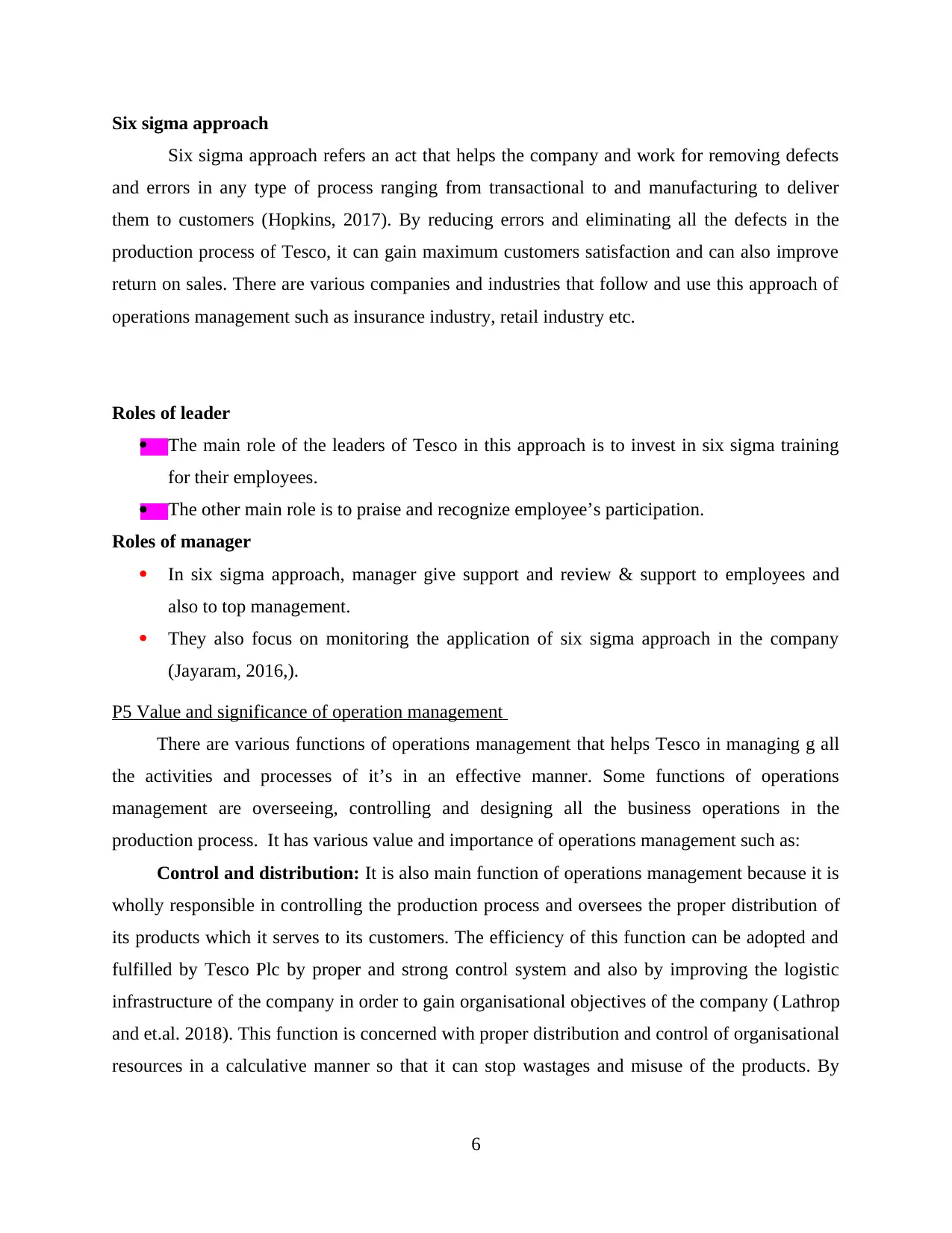
Six sigma approach
Six sigma approach refers an act that helps the company and work for removing defects
and errors in any type of process ranging from transactional to and manufacturing to deliver
them to customers (Hopkins, 2017). By reducing errors and eliminating all the defects in the
production process of Tesco, it can gain maximum customers satisfaction and can also improve
return on sales. There are various companies and industries that follow and use this approach of
operations management such as insurance industry, retail industry etc.
Roles of leader
The main role of the leaders of Tesco in this approach is to invest in six sigma training
for their employees.
The other main role is to praise and recognize employee’s participation.
Roles of manager
In six sigma approach, manager give support and review & support to employees and
also to top management.
They also focus on monitoring the application of six sigma approach in the company
(Jayaram, 2016,).
P5 Value and significance of operation management
There are various functions of operations management that helps Tesco in managing g all
the activities and processes of it’s in an effective manner. Some functions of operations
management are overseeing, controlling and designing all the business operations in the
production process. It has various value and importance of operations management such as:
Control and distribution: It is also main function of operations management because it is
wholly responsible in controlling the production process and oversees the proper distribution of
its products which it serves to its customers. The efficiency of this function can be adopted and
fulfilled by Tesco Plc by proper and strong control system and also by improving the logistic
infrastructure of the company in order to gain organisational objectives of the company (Lathrop
and et.al. 2018). This function is concerned with proper distribution and control of organisational
resources in a calculative manner so that it can stop wastages and misuse of the products. By
6
Six sigma approach refers an act that helps the company and work for removing defects
and errors in any type of process ranging from transactional to and manufacturing to deliver
them to customers (Hopkins, 2017). By reducing errors and eliminating all the defects in the
production process of Tesco, it can gain maximum customers satisfaction and can also improve
return on sales. There are various companies and industries that follow and use this approach of
operations management such as insurance industry, retail industry etc.
Roles of leader
The main role of the leaders of Tesco in this approach is to invest in six sigma training
for their employees.
The other main role is to praise and recognize employee’s participation.
Roles of manager
In six sigma approach, manager give support and review & support to employees and
also to top management.
They also focus on monitoring the application of six sigma approach in the company
(Jayaram, 2016,).
P5 Value and significance of operation management
There are various functions of operations management that helps Tesco in managing g all
the activities and processes of it’s in an effective manner. Some functions of operations
management are overseeing, controlling and designing all the business operations in the
production process. It has various value and importance of operations management such as:
Control and distribution: It is also main function of operations management because it is
wholly responsible in controlling the production process and oversees the proper distribution of
its products which it serves to its customers. The efficiency of this function can be adopted and
fulfilled by Tesco Plc by proper and strong control system and also by improving the logistic
infrastructure of the company in order to gain organisational objectives of the company (Lathrop
and et.al. 2018). This function is concerned with proper distribution and control of organisational
resources in a calculative manner so that it can stop wastages and misuse of the products. By
6
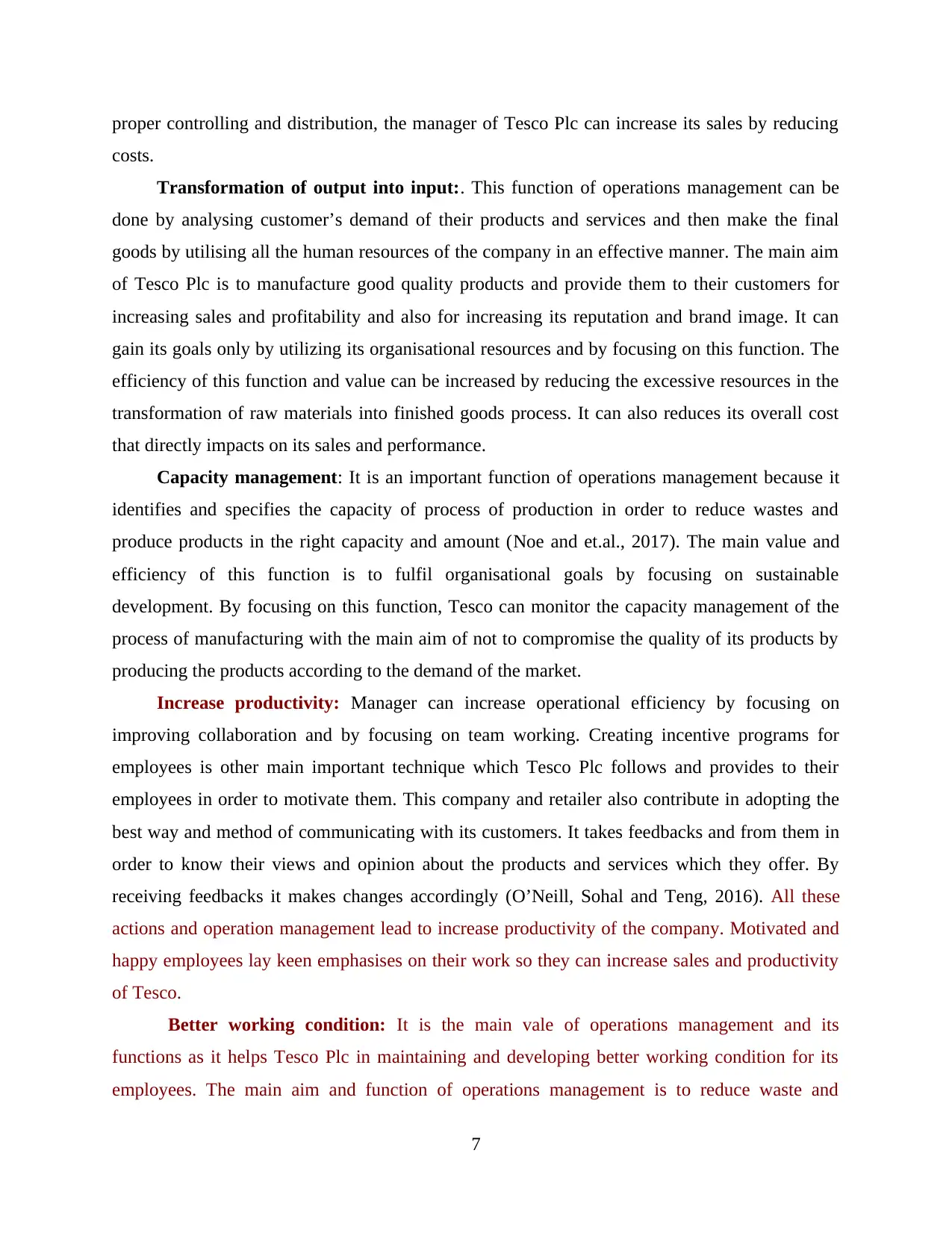
proper controlling and distribution, the manager of Tesco Plc can increase its sales by reducing
costs.
Transformation of output into input:. This function of operations management can be
done by analysing customer’s demand of their products and services and then make the final
goods by utilising all the human resources of the company in an effective manner. The main aim
of Tesco Plc is to manufacture good quality products and provide them to their customers for
increasing sales and profitability and also for increasing its reputation and brand image. It can
gain its goals only by utilizing its organisational resources and by focusing on this function. The
efficiency of this function and value can be increased by reducing the excessive resources in the
transformation of raw materials into finished goods process. It can also reduces its overall cost
that directly impacts on its sales and performance.
Capacity management: It is an important function of operations management because it
identifies and specifies the capacity of process of production in order to reduce wastes and
produce products in the right capacity and amount (Noe and et.al., 2017). The main value and
efficiency of this function is to fulfil organisational goals by focusing on sustainable
development. By focusing on this function, Tesco can monitor the capacity management of the
process of manufacturing with the main aim of not to compromise the quality of its products by
producing the products according to the demand of the market.
Increase productivity: Manager can increase operational efficiency by focusing on
improving collaboration and by focusing on team working. Creating incentive programs for
employees is other main important technique which Tesco Plc follows and provides to their
employees in order to motivate them. This company and retailer also contribute in adopting the
best way and method of communicating with its customers. It takes feedbacks and from them in
order to know their views and opinion about the products and services which they offer. By
receiving feedbacks it makes changes accordingly (O’Neill, Sohal and Teng, 2016). All these
actions and operation management lead to increase productivity of the company. Motivated and
happy employees lay keen emphasises on their work so they can increase sales and productivity
of Tesco.
Better working condition: It is the main vale of operations management and its
functions as it helps Tesco Plc in maintaining and developing better working condition for its
employees. The main aim and function of operations management is to reduce waste and
7
costs.
Transformation of output into input:. This function of operations management can be
done by analysing customer’s demand of their products and services and then make the final
goods by utilising all the human resources of the company in an effective manner. The main aim
of Tesco Plc is to manufacture good quality products and provide them to their customers for
increasing sales and profitability and also for increasing its reputation and brand image. It can
gain its goals only by utilizing its organisational resources and by focusing on this function. The
efficiency of this function and value can be increased by reducing the excessive resources in the
transformation of raw materials into finished goods process. It can also reduces its overall cost
that directly impacts on its sales and performance.
Capacity management: It is an important function of operations management because it
identifies and specifies the capacity of process of production in order to reduce wastes and
produce products in the right capacity and amount (Noe and et.al., 2017). The main value and
efficiency of this function is to fulfil organisational goals by focusing on sustainable
development. By focusing on this function, Tesco can monitor the capacity management of the
process of manufacturing with the main aim of not to compromise the quality of its products by
producing the products according to the demand of the market.
Increase productivity: Manager can increase operational efficiency by focusing on
improving collaboration and by focusing on team working. Creating incentive programs for
employees is other main important technique which Tesco Plc follows and provides to their
employees in order to motivate them. This company and retailer also contribute in adopting the
best way and method of communicating with its customers. It takes feedbacks and from them in
order to know their views and opinion about the products and services which they offer. By
receiving feedbacks it makes changes accordingly (O’Neill, Sohal and Teng, 2016). All these
actions and operation management lead to increase productivity of the company. Motivated and
happy employees lay keen emphasises on their work so they can increase sales and productivity
of Tesco.
Better working condition: It is the main vale of operations management and its
functions as it helps Tesco Plc in maintaining and developing better working condition for its
employees. The main aim and function of operations management is to reduce waste and
7
⊘ This is a preview!⊘
Do you want full access?
Subscribe today to unlock all pages.

Trusted by 1+ million students worldwide
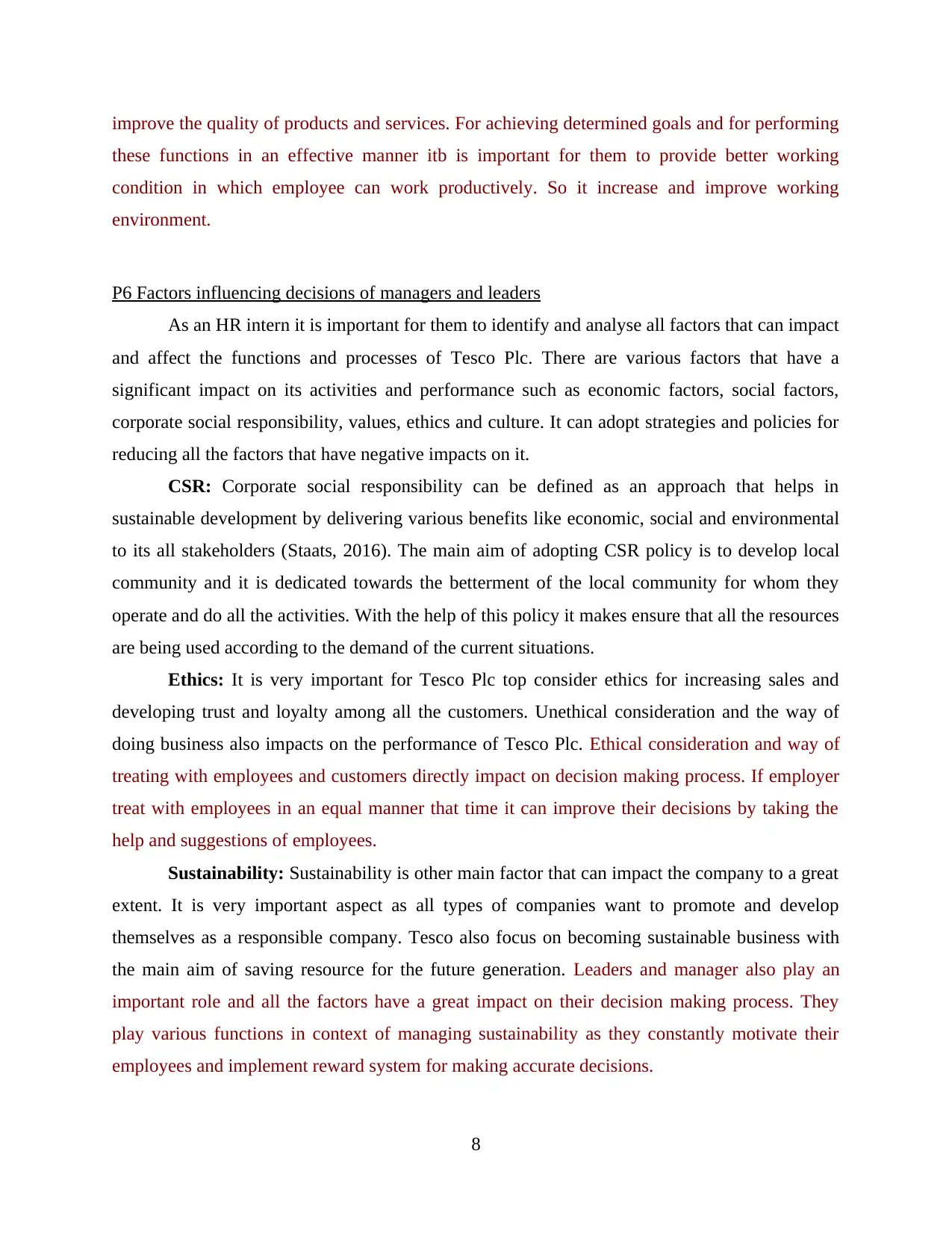
improve the quality of products and services. For achieving determined goals and for performing
these functions in an effective manner itb is important for them to provide better working
condition in which employee can work productively. So it increase and improve working
environment.
P6 Factors influencing decisions of managers and leaders
As an HR intern it is important for them to identify and analyse all factors that can impact
and affect the functions and processes of Tesco Plc. There are various factors that have a
significant impact on its activities and performance such as economic factors, social factors,
corporate social responsibility, values, ethics and culture. It can adopt strategies and policies for
reducing all the factors that have negative impacts on it.
CSR: Corporate social responsibility can be defined as an approach that helps in
sustainable development by delivering various benefits like economic, social and environmental
to its all stakeholders (Staats, 2016). The main aim of adopting CSR policy is to develop local
community and it is dedicated towards the betterment of the local community for whom they
operate and do all the activities. With the help of this policy it makes ensure that all the resources
are being used according to the demand of the current situations.
Ethics: It is very important for Tesco Plc top consider ethics for increasing sales and
developing trust and loyalty among all the customers. Unethical consideration and the way of
doing business also impacts on the performance of Tesco Plc. Ethical consideration and way of
treating with employees and customers directly impact on decision making process. If employer
treat with employees in an equal manner that time it can improve their decisions by taking the
help and suggestions of employees.
Sustainability: Sustainability is other main factor that can impact the company to a great
extent. It is very important aspect as all types of companies want to promote and develop
themselves as a responsible company. Tesco also focus on becoming sustainable business with
the main aim of saving resource for the future generation. Leaders and manager also play an
important role and all the factors have a great impact on their decision making process. They
play various functions in context of managing sustainability as they constantly motivate their
employees and implement reward system for making accurate decisions.
8
these functions in an effective manner itb is important for them to provide better working
condition in which employee can work productively. So it increase and improve working
environment.
P6 Factors influencing decisions of managers and leaders
As an HR intern it is important for them to identify and analyse all factors that can impact
and affect the functions and processes of Tesco Plc. There are various factors that have a
significant impact on its activities and performance such as economic factors, social factors,
corporate social responsibility, values, ethics and culture. It can adopt strategies and policies for
reducing all the factors that have negative impacts on it.
CSR: Corporate social responsibility can be defined as an approach that helps in
sustainable development by delivering various benefits like economic, social and environmental
to its all stakeholders (Staats, 2016). The main aim of adopting CSR policy is to develop local
community and it is dedicated towards the betterment of the local community for whom they
operate and do all the activities. With the help of this policy it makes ensure that all the resources
are being used according to the demand of the current situations.
Ethics: It is very important for Tesco Plc top consider ethics for increasing sales and
developing trust and loyalty among all the customers. Unethical consideration and the way of
doing business also impacts on the performance of Tesco Plc. Ethical consideration and way of
treating with employees and customers directly impact on decision making process. If employer
treat with employees in an equal manner that time it can improve their decisions by taking the
help and suggestions of employees.
Sustainability: Sustainability is other main factor that can impact the company to a great
extent. It is very important aspect as all types of companies want to promote and develop
themselves as a responsible company. Tesco also focus on becoming sustainable business with
the main aim of saving resource for the future generation. Leaders and manager also play an
important role and all the factors have a great impact on their decision making process. They
play various functions in context of managing sustainability as they constantly motivate their
employees and implement reward system for making accurate decisions.
8
Paraphrase This Document
Need a fresh take? Get an instant paraphrase of this document with our AI Paraphraser
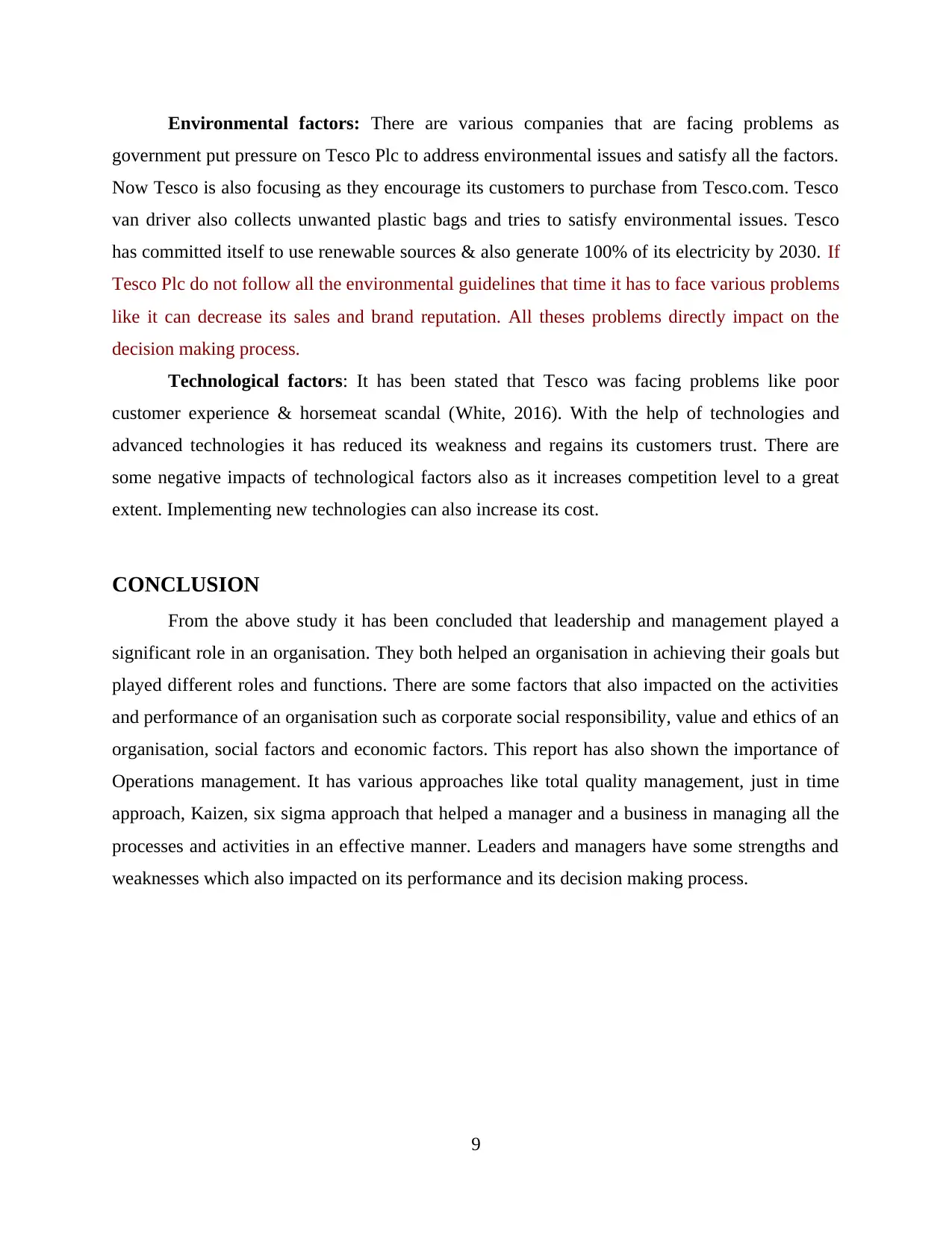
Environmental factors: There are various companies that are facing problems as
government put pressure on Tesco Plc to address environmental issues and satisfy all the factors.
Now Tesco is also focusing as they encourage its customers to purchase from Tesco.com. Tesco
van driver also collects unwanted plastic bags and tries to satisfy environmental issues. Tesco
has committed itself to use renewable sources & also generate 100% of its electricity by 2030. If
Tesco Plc do not follow all the environmental guidelines that time it has to face various problems
like it can decrease its sales and brand reputation. All theses problems directly impact on the
decision making process.
Technological factors: It has been stated that Tesco was facing problems like poor
customer experience & horsemeat scandal (White, 2016). With the help of technologies and
advanced technologies it has reduced its weakness and regains its customers trust. There are
some negative impacts of technological factors also as it increases competition level to a great
extent. Implementing new technologies can also increase its cost.
CONCLUSION
From the above study it has been concluded that leadership and management played a
significant role in an organisation. They both helped an organisation in achieving their goals but
played different roles and functions. There are some factors that also impacted on the activities
and performance of an organisation such as corporate social responsibility, value and ethics of an
organisation, social factors and economic factors. This report has also shown the importance of
Operations management. It has various approaches like total quality management, just in time
approach, Kaizen, six sigma approach that helped a manager and a business in managing all the
processes and activities in an effective manner. Leaders and managers have some strengths and
weaknesses which also impacted on its performance and its decision making process.
9
government put pressure on Tesco Plc to address environmental issues and satisfy all the factors.
Now Tesco is also focusing as they encourage its customers to purchase from Tesco.com. Tesco
van driver also collects unwanted plastic bags and tries to satisfy environmental issues. Tesco
has committed itself to use renewable sources & also generate 100% of its electricity by 2030. If
Tesco Plc do not follow all the environmental guidelines that time it has to face various problems
like it can decrease its sales and brand reputation. All theses problems directly impact on the
decision making process.
Technological factors: It has been stated that Tesco was facing problems like poor
customer experience & horsemeat scandal (White, 2016). With the help of technologies and
advanced technologies it has reduced its weakness and regains its customers trust. There are
some negative impacts of technological factors also as it increases competition level to a great
extent. Implementing new technologies can also increase its cost.
CONCLUSION
From the above study it has been concluded that leadership and management played a
significant role in an organisation. They both helped an organisation in achieving their goals but
played different roles and functions. There are some factors that also impacted on the activities
and performance of an organisation such as corporate social responsibility, value and ethics of an
organisation, social factors and economic factors. This report has also shown the importance of
Operations management. It has various approaches like total quality management, just in time
approach, Kaizen, six sigma approach that helped a manager and a business in managing all the
processes and activities in an effective manner. Leaders and managers have some strengths and
weaknesses which also impacted on its performance and its decision making process.
9
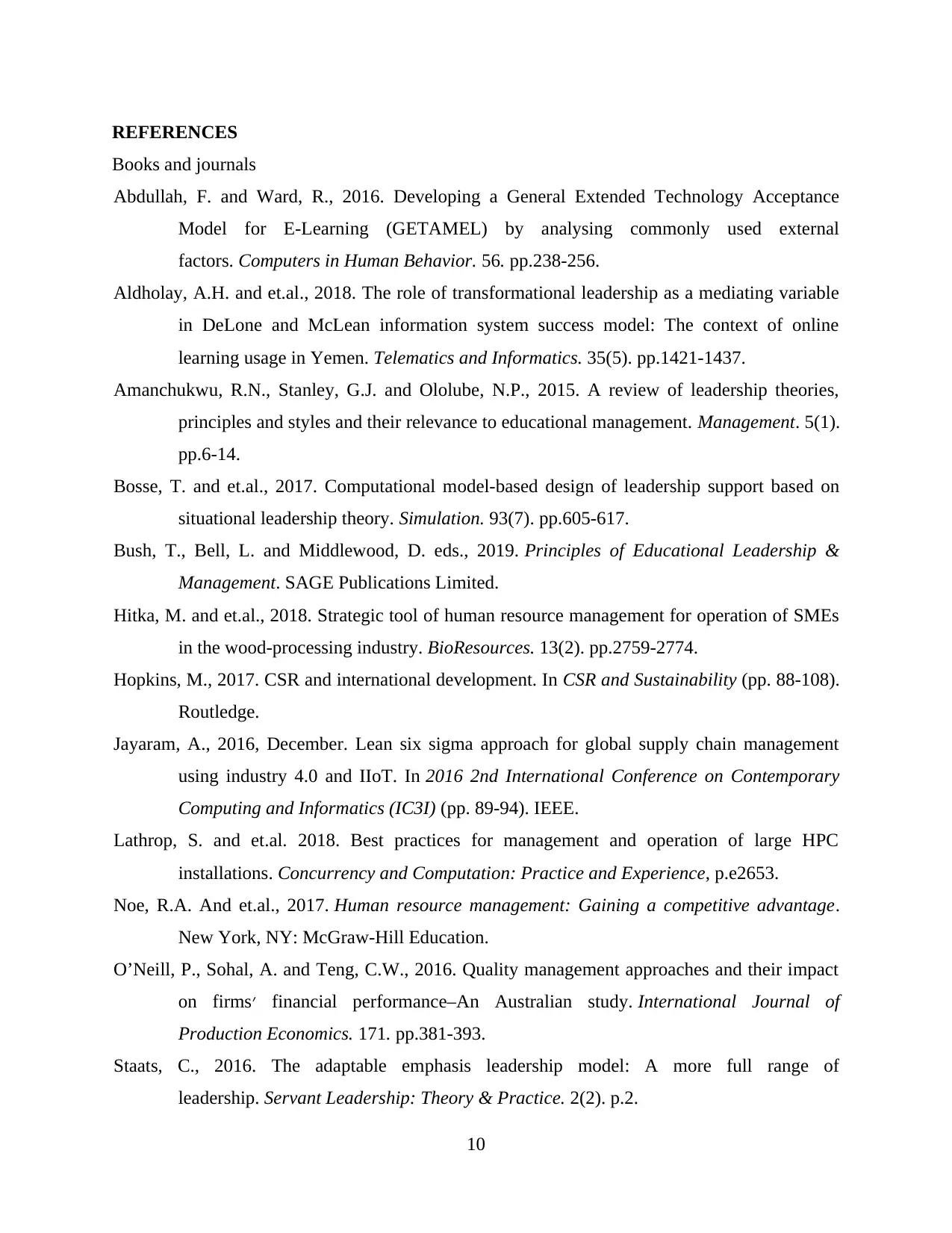
REFERENCES
Books and journals
Abdullah, F. and Ward, R., 2016. Developing a General Extended Technology Acceptance
Model for E-Learning (GETAMEL) by analysing commonly used external
factors. Computers in Human Behavior. 56. pp.238-256.
Aldholay, A.H. and et.al., 2018. The role of transformational leadership as a mediating variable
in DeLone and McLean information system success model: The context of online
learning usage in Yemen. Telematics and Informatics. 35(5). pp.1421-1437.
Amanchukwu, R.N., Stanley, G.J. and Ololube, N.P., 2015. A review of leadership theories,
principles and styles and their relevance to educational management. Management. 5(1).
pp.6-14.
Bosse, T. and et.al., 2017. Computational model-based design of leadership support based on
situational leadership theory. Simulation. 93(7). pp.605-617.
Bush, T., Bell, L. and Middlewood, D. eds., 2019. Principles of Educational Leadership &
Management. SAGE Publications Limited.
Hitka, M. and et.al., 2018. Strategic tool of human resource management for operation of SMEs
in the wood-processing industry. BioResources. 13(2). pp.2759-2774.
Hopkins, M., 2017. CSR and international development. In CSR and Sustainability (pp. 88-108).
Routledge.
Jayaram, A., 2016, December. Lean six sigma approach for global supply chain management
using industry 4.0 and IIoT. In 2016 2nd International Conference on Contemporary
Computing and Informatics (IC3I) (pp. 89-94). IEEE.
Lathrop, S. and et.al. 2018. Best practices for management and operation of large HPC
installations. Concurrency and Computation: Practice and Experience, p.e2653.
Noe, R.A. And et.al., 2017. Human resource management: Gaining a competitive advantage.
New York, NY: McGraw-Hill Education.
O’Neill, P., Sohal, A. and Teng, C.W., 2016. Quality management approaches and their impact
on firms׳ financial performance–An Australian study. International Journal of
Production Economics. 171. pp.381-393.
Staats, C., 2016. The adaptable emphasis leadership model: A more full range of
leadership. Servant Leadership: Theory & Practice. 2(2). p.2.
10
Books and journals
Abdullah, F. and Ward, R., 2016. Developing a General Extended Technology Acceptance
Model for E-Learning (GETAMEL) by analysing commonly used external
factors. Computers in Human Behavior. 56. pp.238-256.
Aldholay, A.H. and et.al., 2018. The role of transformational leadership as a mediating variable
in DeLone and McLean information system success model: The context of online
learning usage in Yemen. Telematics and Informatics. 35(5). pp.1421-1437.
Amanchukwu, R.N., Stanley, G.J. and Ololube, N.P., 2015. A review of leadership theories,
principles and styles and their relevance to educational management. Management. 5(1).
pp.6-14.
Bosse, T. and et.al., 2017. Computational model-based design of leadership support based on
situational leadership theory. Simulation. 93(7). pp.605-617.
Bush, T., Bell, L. and Middlewood, D. eds., 2019. Principles of Educational Leadership &
Management. SAGE Publications Limited.
Hitka, M. and et.al., 2018. Strategic tool of human resource management for operation of SMEs
in the wood-processing industry. BioResources. 13(2). pp.2759-2774.
Hopkins, M., 2017. CSR and international development. In CSR and Sustainability (pp. 88-108).
Routledge.
Jayaram, A., 2016, December. Lean six sigma approach for global supply chain management
using industry 4.0 and IIoT. In 2016 2nd International Conference on Contemporary
Computing and Informatics (IC3I) (pp. 89-94). IEEE.
Lathrop, S. and et.al. 2018. Best practices for management and operation of large HPC
installations. Concurrency and Computation: Practice and Experience, p.e2653.
Noe, R.A. And et.al., 2017. Human resource management: Gaining a competitive advantage.
New York, NY: McGraw-Hill Education.
O’Neill, P., Sohal, A. and Teng, C.W., 2016. Quality management approaches and their impact
on firms׳ financial performance–An Australian study. International Journal of
Production Economics. 171. pp.381-393.
Staats, C., 2016. The adaptable emphasis leadership model: A more full range of
leadership. Servant Leadership: Theory & Practice. 2(2). p.2.
10
⊘ This is a preview!⊘
Do you want full access?
Subscribe today to unlock all pages.

Trusted by 1+ million students worldwide
1 out of 13
Related Documents
Your All-in-One AI-Powered Toolkit for Academic Success.
+13062052269
info@desklib.com
Available 24*7 on WhatsApp / Email
![[object Object]](/_next/static/media/star-bottom.7253800d.svg)
Unlock your academic potential
Copyright © 2020–2026 A2Z Services. All Rights Reserved. Developed and managed by ZUCOL.





